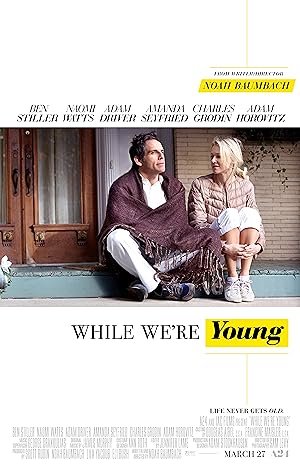While We’re Young is about a middle aged NY couple, played by Ben Stiller and Naomi Watts, who are stuck on the rung of life personally and professionally. In an effort to jumpstart their lives, they welcome the new friendship of an admiring younger couple, played by Adam Driver and Amanda Seyfried.
Since Squid and the Whale and until Mistress America (I haven’t seen Francis Ha yet), Baumbach has largely abandoned the financial practicalities of being an unsuccessful or even successful intellectual in NYC. Instead he embraces the absurdities of the Park Slope parental vibe and how exiled Stiller and Watts character feels from their peers and their lives. They are too old to have potential and start anew-they have established characters and careers whether they like it or not, but too young to give up and feel satisfied with what they’ve accomplished. To finally be around young people who admire them and introduce them to new things jolts them out of limbo/statsis/perguatory. Unfortunately I saw one plot twist coming a mile away.
While We’re Young could be called a comedic attempt at a thriller. While We’re Young feels like Noah Baumbach’s attempt at Single White Female, but with a couple and only with psychological danger. I know that a plot twist is used to represent how the middle generation feels simultaneously betrayed by the older and younger one-we followed your rules, the younger ones trash the rules, but the younger ones get rewarded, and I don’t.
While We’re Young feels more like a straight comedy driven by the awkwardness of an older couple trying to engage in activities with the younger generation. After one scene with an Ayahuasca ceremony, While We’re Young entered into cheap gimmick territory and I felt less engaged in the predictable plot. Baumbach’s films are usually unpredictable and funny, but the point isn’t to be funny. I would almost say skip While We’re Young and watch Sound of My Voice, which also involves a couple at a psychological crossroads that could lead each person into separate directions, but the movies have inherently different motivations as to how and why the couples got there.
Unfortunately Baumbach skipped over the more emotionally rich and painful moments in While We’re Young. Even though it is alluded to, isn’t what Driver does to Stiller kind of what Stiller did to Watts in order to get what little success he has? Even though we’re told what Watts’ character does, we really don’t see it. Stiller’s character is just as much of a user, and even though the older couple sincerely love each other, it felt like a missed opportunity that While We’re Young didn’t explore that tension.
For me, the most heart wrenching moment of betrayal is when the older couple decide to surprise their age appropriate friends. I put up with your baby phase, and then you do THIS! Pardon my French, but it was such a shitty thing to do that I have no idea how their friendship survived it.
When Stiller is in movies that are explicitly comedies, I am more likely to enjoy him. I don’t like him in dramas or even dramas where there is an element of comedy. Unlike many comedians who successfully transition from comedy to drama, I can see him acting, and his schtick never changes. Watts should have been given more to do-we’re told what she does, but never shown it. Watts does some of her finest acting here as she faithfully follows her husband down his farcical midlife crisis journey to capriciousness. Casting Charles Grodin was brilliant, but he was used too sparingly and too late.
In the end, what makes While We’re Young emotionally unforgivable is that it propagates the symbol of a baby as a sign that a couple has a bright future and will reach the next, better phase of their life. Tell that to all the couples who had a baby in the hopes that it would fix their marriage and problems, but only exacerbated them. While We’re Young is Baumbach drinking the Kool-Aid and bet
Stay In The Know
Join my mailing list to get updates about recent reviews, upcoming speaking engagements, and film news.





